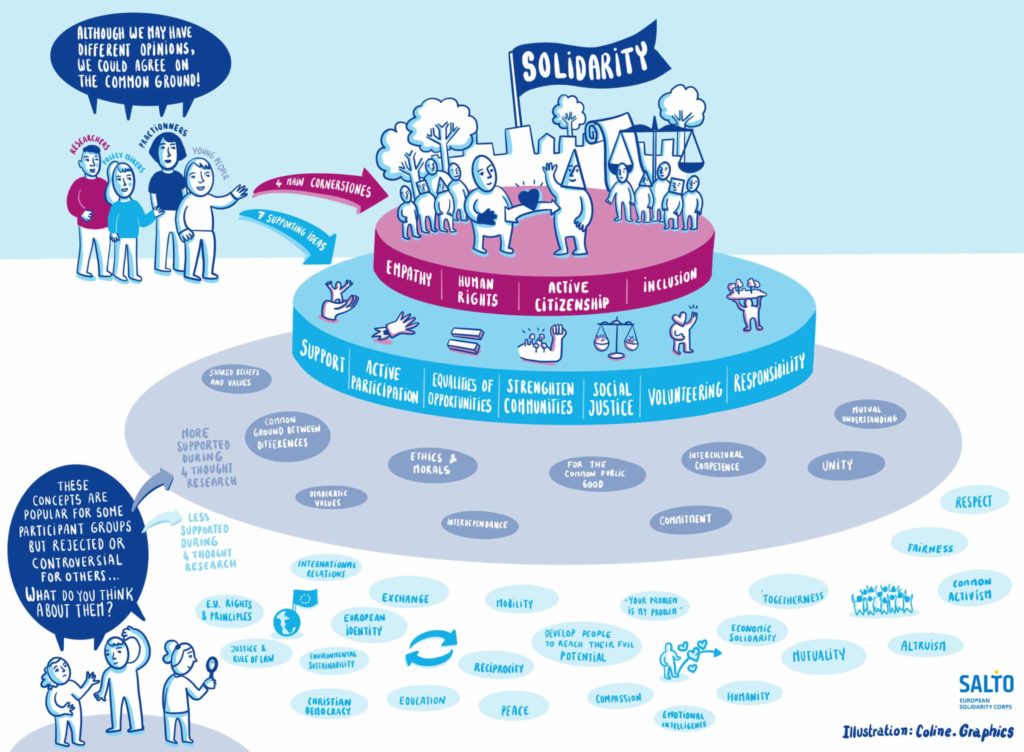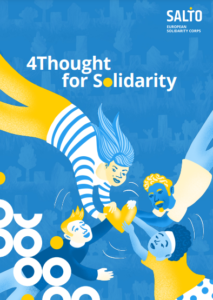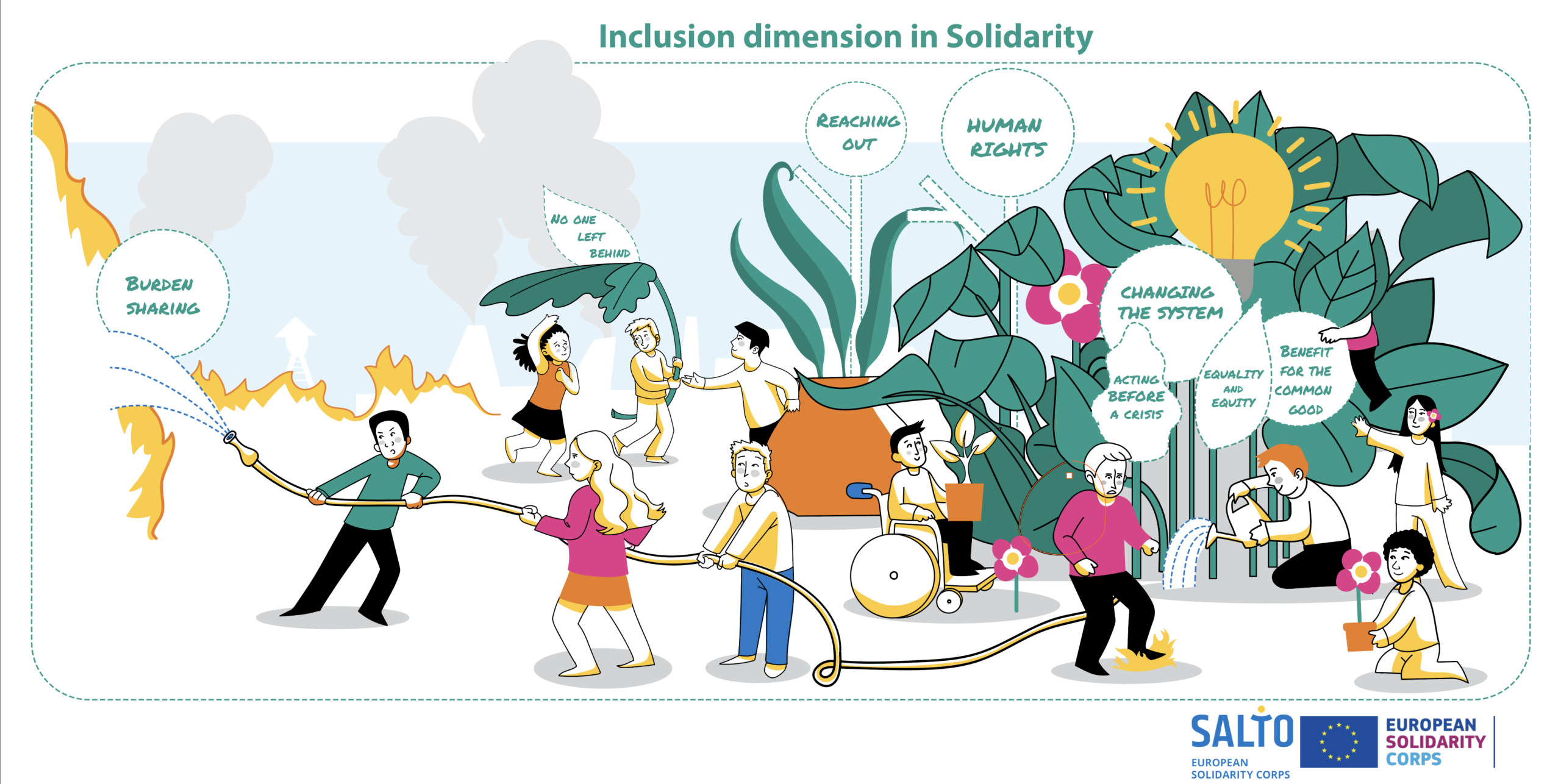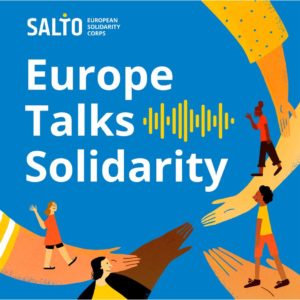

Module 2: Understanding Solidarity
Understanding Solidarity
The National Agency planets and SALTO satellites rotate around SOLidarity, but what does solidarity really mean? How to explain it if someone asks? What tools could be useful for your work? Where to get more information?

Common Ground for Solidarity. Illustration: Coline Robin
“You need to take time to digest the purpose of the programme before jumping into the rules and regulations. Understanding the whys of the programme makes the implementation much easier.”
Suzanne Kavanaugh, Ireland
Indeed, understanding how solidarity is reflected in the European Solidarity Corps is the key for a good quality implementation of the programme.
One of the main priorities of our work is to contribute to the debate on the concept of solidarity within the Solidarity Corps Programme and beyond. We aim to stimulate reflection on solidarity, its relevance in Europe and in the international youth work, the volunteering field and the civil society sector. We hope to motivate stakeholders to engage and act in solidarity in, with and through their projects.
4thought for Solidarity
With the establishment of the SALTO ESC Resource Centre in 2018, one of our first tasks was to delve into the concept of solidarity.

This project called ‘4Thought’ created a vision of what the concept of solidarity means to different people, while assisting in the implementation of the European Solidarity Corps by making clearer what is meant by a solidarity activity.
The study was conducted by Snežana Bačlija Knoch & Susie Nicodemi, who reached out to practitioners, young people, researchers and policy makers through surveys, interviews and consultations to examine how solidarity is understood in the international youth work field.
Their work led to a report called ‘4Thought for Solidarity’ that gives you a detailed overview of the findings.
In addition to the report, we developed a collection of study-based resources to help understand and communicate the findings. Now it’s up to you to choose what works best for you.
Summary & podcast
Too busy to read the full report? No problem! An illustrated summary will give you an overview of the study. If you prefer listening to reading, there is a podcast where the authors Snežana and Susie present the 4Thought project.
A concise version under the title of Solidarity cake, anyone? is also available.
Playlist & visualisations
To get an idea of the ‘4Thought’ concept and the resulting video material, we suggest you watch the first video of our ‘Solidarity‘ playlist:
The ‘Solidarity’ playlist consists of 4 videos, each of which focuses on specific topics of the study. Please note that the videos have also been translated into sign language.
We also produced 8 illustrations to visually convey the ‘4Thought’ concept. See an example below:

Feel free to use the videos and the visualisations to communicate different aspects of solidarity to (potential) beneficiary organisations, youth, external assessors, and other stakeholders. The more you use the four pillars of solidarity, the better people will adopt them!
Webinars and Conferences on Solidarity
Even if you can learn a lot on your own, in order to open up new horizons, it is sometimes necessary to exchange ideas with others.
This is why, at the SALTO ESC Resource Centre, we are committed to offering you and your colleagues opportunities for regular interaction.
Besides internal events, there are events aimed at a broader audience:
Europe talks Solidarity conferences
Europe talks Solidarity conferences are organised every two years in cooperation with National Agencies and targeted at a wider audience, including representatives from the public sector, civil society organisations, private sector, advocacy and activist groups as well as media.
Some parts of these conferences are recorded and can be viewed on SALTO ESC’s YouTube playlist ‘Europe Talks Solidarity’, the outcomes are also available on our website
Other events organised by SALTO ESC
Besides ‘Europe talks Solidarity’, we frequently hold other webinars and seminars on solidarity. For updates on our offers, please follow our communication channels.
Deepen your understanding: articles and podcasts on solidarity
Once you become familiar with the basic concept of solidarity, it is time to dig deeper. This is where the articles and podcast come to the rescue.
Articles on Solidarity
The articles on Solidarity reflect the research gaps identified during the ‘4Thought’ process. They are produced to promote communication and the exchange of ideas between researchers and individuals engaged in solidarity activities. They cover a wide range of topics and perspectives such as education for solidarity and peace, online solidarity, or empowering marginalised groups through solidarity projects.
Europe talks Solidarity podcast
 The podcast is an audio journey that takes you through Europe and beyond in search of a common narrative of solidarity inspired by civil society activists and researchers.
The podcast is an audio journey that takes you through Europe and beyond in search of a common narrative of solidarity inspired by civil society activists and researchers.
The first podcast season accompanies articles on solidarity, giving a more hands-on perspective on academic topics. In season two we look deeper into societal aspects of solidarity: what makes a city solidary? How climate justice, LGBTQ movements, combating crisis situations and working with young people in prison connect to solidarity.
In season three we are discovering the connections of solidarity, volunteering and active participation in democratice life.
Come with us on the journey and listen to the Europe Talks Solidarity Podcasts!
Practical Tools to enhance solidarity
A framework for solidarity in European Solidarity Corps projects
This Framework helps recognise the solidarity dimension in ESC projects. You can use it for assessments, monitoring and reporting purposes.
The Framework is based on the Quality Label assessment criteria and the understanding of solidarity as defined in the ‘4Thought’ study. It rests on four pillars: Active Citizenship, Empathy, Human Rights, and Inclusion. However, it isn’t an exhaustive checklist and it can be adjusted to allow other understandings.
Available in SALTO ESC’s Solidarity Corps Staff Team (in MS Teams).
T-kit: Value-based learning in mobility projects
T-kits (Council of Europe’s training kits) are methodological publications for trainers and facilitators working with youth. They are easy-to-use, themed educational materials designed to train and facilitate learning with youth groups.
This T-Kit has been written by and for learning facilitators, to help start their thinking process about an important, but also complex topic: value-based learning in mobility projects such as ESC volunteering.
The T-Kit is divided into two parts: one conceptual and one practical. The conceptual part lays the foundation for value-based learning in mobility, while the practical part includes concrete activities and thought provocateurs, which address dilemmas and questions that may arise when implementing activities. We warmly recommend checking out chapter 4 and the tools it provides – they could be useful when discussing values with ESC volunteers!
Community Impact in Learning Mobility Projects – Practical Guide
The Guide takes the reader step-by-step through the concept of community impact. It explains the terms community, impact and highlights the challenges of measuring and increasing the impact of the projects on communities.
The publication is available in English and – thanks to the colleagues of the French National Agency – in a nicely illustrated version in French.
Creating Community Impact through Solidarity
Are you interested about how community impact occurs through European Solidarity Corps (ESC) funded projects?
The publication Creating Community Impact through Solidarity explores a series of 15 examples of practice from organisations implementing European Solidarity Corps funded actions.
Solidarity – past, present and future
From the concept of Solidarité Européenne born after the French Revolution, to the former EC President Jean-Claude Juncker’s State of the Union Address in 2016, solidarity has come a long way. While solidarity is fundamentally important in the context of today’s European Union, the word ‘solidarity’ in itself might not provoke only positive associations in and beyond Europe.
To know more about the different historical and political contexts in which the term has been used to date, watch the video below.
During the ‘4Thought’ process it became clear that there is no one definition of solidarity. It also became clear there are still many open questions that need further examination and common discussion within the ESC community of practice. Watch the video to find out more.
What’s next?
With the emergence of the Humanitarian Aid Volunteering and the global challenges of the 2020s it is becoming evident that global issues will be at the heart of solidarity in the coming years – the key words being sustainability, inclusion, active participation in democratic life and digitalisation.
The past few years have been a continuum of crises from Brexit to wars, and from the rise of all sorts of extremism to growing concern over climate change and biodiversity loss. In short, our sense of solidarity is being challenged in more ways than we could ever have expected.
This is why we celestial bodies of the ESC Space – National Agencies and SALTO Resource Centres – have an important mission in promoting the importance of solidarity. We hope you will join us in contributing to the debate!
Continue navigating the ESC Space >>
Enjoy zero gravity and get absorbed in history and good practices!